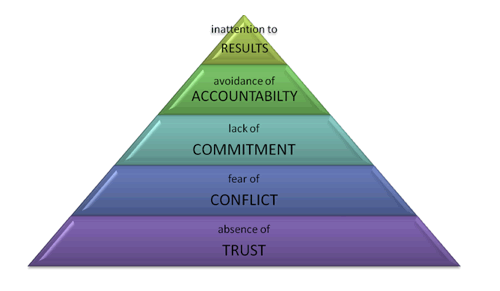 [This post is from a series of notes from Catalyst 2012]
[This post is from a series of notes from Catalyst 2012]
Patrick Lencioni is the author of popular business fables such as the Five Dysfunctions of a Team, Silos, Politics, and Turf Wars, and more. With the release of his recent book The Advantage, Patrick focused specifically on the topic of organizational health. Ironically, health is one of the most important keys to success is any organization yet it consistently remains to be an untapped advantage.
Any organization has two requirements for success. One requirement is objective and easily measurable, the other is messy, emotional, and difficult to measure. The two requirements for success is any organization is being smart and being healthy. Being smart refers to concepts like having a strategy, quality marketing, being financially responsible, or utilizing technology. Being healthy refers to having minimal politics, minimal confusion, high morale, and low turnover. Most people desire a healthy organization, but few people actually take the steps to build a healthy team.
Healthy organizations...
1. Build a cohesive leadership team
2. Create clarity
3. Over-communicate clarity
4. Reinforce clarity
Speciically #1, Building a cohesive leadership team
The following are five critical behaviors for any team. Without the presence of these behaviors your team will not be cohesive, it will not be healthy, and it will ultimately fail.
1. Trust
Teams need to have a vulnerability based trust. This is not "I told you to do this, so I trust that you will do it." Instead it is a trust that is able to say, "I need help" or "I'm sorry." Trust means "being emotionally buck naked." This is critical to the health of a team and teams cannot move onto the next behaviors until this one is dealt with. And the leader has to go first, otherwise it won't work.
2. Conflict
Conflict is good. The most healthy teams are not the ones that always agree, but the ones that know how to have healthy conflict. Without trust conflict means politics, but partnered with trust conflict is the pursuit of truth.
3. Commitment
Force clarity and closure. Clarify what the goals and next steps and bring your team to a closure. This doesn't mean they all agreed about everything, but it does mean that everyone is commitment to the clear decision.
4. Accountability
In a healthy team peers hold each other accountable. Often leaders think they are holding others accountable by firing… firing is often a last act of cowardice. Actually holding your team accountable as a peer group is incredibly difficult.
5. Results
A healthy team will focus on the collective results of the team. It won't be about individual success or department success, but about the entire team.

